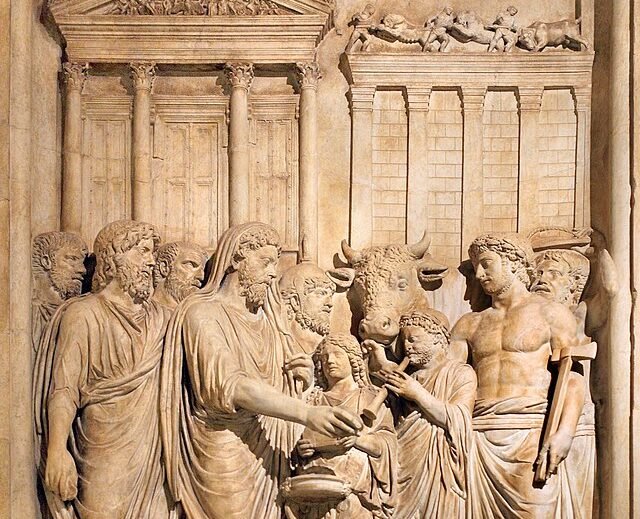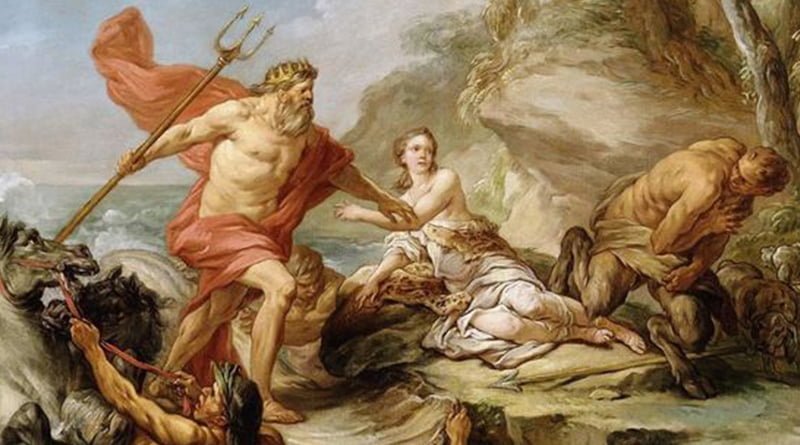Ancient Rome is both the city and the state it founded in Antiquity. This grouping of villages in the 8th century BC. BC managed to dominate the entire Mediterranean world and Western Europe from the 1st to the 5th century through military conquest and the assimilation of local elites. Its domination left important archaeological traces and numerous literary testimonies. It still shapes the image of Western civilization today. During these centuries, Roman civilization went from royalty to an oligarchic republic then to an autocratic empire.
The religion or religions of the Romans is the set of religious practices and beliefs that the Romans considered to be properly Roman (we can then speak of Roman religion), as well as the numerous cults imported or practiced by the populations forming part of the Empire. Roman. In Latin, the word religio does not mean religion but rather ritual obligation and is often used in the plural. This nuance must be kept in mind to avoid terminological confusion.
The Romans considered themselves deeply religious, and they attributed the success of their empire to their collective pietas (pietas) which allowed them to maintain good relations with the gods. According to the legendary history of Rome's early centuries, most religious institutions and rites date back to the early founders, particularly Numa Pompilius, the second king. Little by little, Roman law separated itself from religion.

Contents
ToggleFestivals and Rites of Ancient Rome
Holidays of the month
July 5, 2025 (1 event)
July 5, 2025

On this day, the Romans celebrated Poplifugium. It celebrated the disappearance of Romulus in a violent storm and taken to heaven while he was inspecting his troops near the Goat Swamp. He would then have become the god of the Romans and their city. #mythology #myth #legend #calendar July #4 #rome #romulus #poplifugium
July 6, 2025 (1 event)
July 6, 2025

On this day and for a week, the Romans celebrated the Apollo games in honor of Apollo. These games were established during the Second Punic War, following the true prophecies of the Sibylline Carmina Marciana books. #mythology #myth #legend #calendar #6July #Apollo
July 7, 2025 (1 event)
July 7, 2025

On this day, the Romans celebrated Juno Caprotina in honor of slave women. The priestesses flogged themselves with their fists or pieces of wood. This commemorates a Roman victory by Camillus over the Latins; according to a minor tradition, a Roman servant or slave dressed as a noble woman and surrendered to the Latins as a hostage; That night she climbed a wild fig tree and gave the Romans a signal by torchlight to attack. #mythology #myth #legend #calendar #July 7 #rome #caprotinia
July 8, 2025 (1 event)
–
July 8, 2025
On this day, the Romans celebrated Vitulatio. Macrobius says that it marked a Roman retreat of the Etruscans to Fidenae during the Gallic invasion, and that the Vitulatio commemorated their return victory. The festival was quickly eclipsed by the Ludi Apollinares from July 6 to 13. #mythology #myth #legend #calendar #itulation #Rome #8July
July 19, 2025 (1 event)
July 19, 2025

On this day, the Romans celebrated Lucaria. This very ancient festival has origins unknown to the Romans. The woods were celebrated for driving away demons from the trees. #mythology #myth #legend #calendar #19July #21July #lucaria
July 23, 2025 (1 event)
July 23, 2025

On this day, the Romans celebrated the Neptunalia in honor of Neptune. They built arbors of green wood to get shade and they sacrificed a bull. This made it possible to avoid too big a heat wave. #mythology #myth #legend #calendar #July 23 #rome #neptune
July 25, 2025 (1 event)
July 25, 2025

On this day, the Romans celebrated the Furrinalia. The origins of the festival and the goddess were already unclear during the Republic of Rome. #mythology #myth #legend #calendar #25July #rome #furrinalia
Cultural areas of ancient Rome
The main essential characteristic of Roman religious practices is orthopraxy, a cult based on the proper execution of rites and not on faith or belief in a dogma.
The Romans nevertheless had beliefs, starting with the effectiveness of their rites addressed to numerous divine powers, that is to say superhuman, the deities. These deities have fields of action which can be linked to a place or a function.
They can have a “topical power” (linked to a place) like Capitoline Jupiter (from Capitoline Hill) or Olympian Zeus (Olympia in Greece). But they can also have a so-called “functional” specialty, like Mars who is the “god of War” (military combat as well as for harvests against insects).
The Roman religion is distinguished from other Indo-European religions by the almost total absence of religious myths featuring their gods. As a result, the Roman gods present a strange face in many respects: on the one hand attention is focused on their power of action (numen) and their intervention in history, because they do not have "over -history » metaphysics; on the other, as a consequence, they are only pale, poorly personalized figures. They are first of all powers. And the Romans, lacking their own myths, will then adopt Greek myths.
The founding myth is that of Romulus and Remus, two brothers abandoned on the banks of the Tiber and miraculously nursed by a she-wolf. Romulus, armed with the extraordinary omen of the gods constituted by twelve vultures, traced the contours of the city on the Palatine and killed his brother after the latter had crossed the furrow with a mocking air. So Rome became for the Romans not only a living space but also consecrated ground.
According to Livy, it was after the reign of Romulus that Numa Pompilius, second king of Rome, established official religious practices. After the death of Romulus, he transferred part of the religious power of the king, then at the same time warrior, legislator and priest, to priestly colleges, selected from the Fathers, characters constituting the nobility chosen by Romulus. He founded the temple of Janus, extended the colleges of the Flamins, to Mars and to Quirinus, and created the order of the Salians. He appointed a high pontiff, religious leader responsible for the proper execution of the rites.






